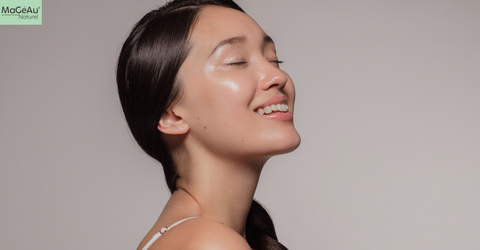We’ve all been there. Staring at a cluttered bathroom shelf filled with various skincare products, unsure of what’s actually right for us.
Does your skin feel tight and dry after washing? Is it oily within hours? Or maybe it’s prone to redness and irritation? Understanding your skin type is the first step in finding a skincare routine that truly works.
But it’s not as simple as just oily or dry. Your skin’s needs can change with the weather, your lifestyle, and even your stress levels.
In this blog, we’ll explore how to figure out your skin type and offer solutions for the common issues you face. We’ll also recommend some easy-to-follow, natural solutions you can add to your routine to keep your skin glowing and healthy.
Why Skin Type Matters
Your skin type is the foundation of your skincare routine. Choosing the wrong products for your skin can cause more harm than good, leading to breakouts, dryness, irritation, or even premature aging. Understanding your skin type helps you avoid these issues and make informed choices that keep your skin in top shape. So, let’s dive into how to figure out your skin type.
How to Determine Your Skin Type
Before jumping into solutions, let’s first understand your skin better. Here are the common skin types:
1. Normal Skin: If your skin feels comfortable all day long and has a balanced texture, not too oily or dry, you’re likely dealing with normal skin. It’s smooth, with few blemishes or dry patches.
2. Oily Skin: If your skin looks shiny by midday or you often deal with clogged pores and acne, you probably have oily skin. This type produces excess sebum (natural oils) that can lead to a greasy appearance and breakouts.
3. Dry Skin: Dry skin feels tight, flaky, and sometimes rough to the touch. You might notice redness or irritation after washing your face. This happens when your skin doesn’t produce enough sebum or is stripped of moisture by harsh products.
4. Combination Skin: This is when different areas of your face behave differently. For example, your T-zone (forehead, nose, and chin) may be oily while your cheeks feel dry. It’s a combination of both oily and dry skin, and managing it can be tricky.
5. Sensitive Skin: If your skin reacts to products with redness, stinging, or irritation, you have sensitive skin. It can also feel tight or appear rashy in response to temperature changes or certain ingredients.
Pro Tip: Your skin type can change with seasons. You may have oily skin in the summer and dry skin in the winter. It’s important to adjust your routine accordingly.
The Perfect Routine for Your Skin Type
Once you’ve figured out your skin type, it’s time to build a skincare routine that works for you. Here’s where many people go wrong—they buy products based on trends or what others recommend, but it’s more important to choose products that directly address your skin’s needs.
1. Hydration is Key
No matter your skin type, hydration is essential. Many people think oily skin doesn’t need moisture, but even oily skin can become dehydrated. If you don’t hydrate properly, your skin may compensate by producing even more oil. On the other hand, dry skin needs moisture to prevent flaking and irritation.
For all skin types, look for products that hydrate deeply. Magnesium, an often overlooked mineral, is fantastic for balancing skin. Magnesium helps to calm irritation, reduce redness, and boost skin’s moisture retention. Incorporate magnesium-rich products, like a magnesium-infused body lotion or facial serum, into your routine for added comfort.
2. The Right Cleanser
Your cleanser is the foundation of your skincare routine. It sets the tone for everything that follows. But choosing the wrong cleanser can disrupt your skin’s natural barrier, leading to dryness or oil buildup.
- For Oily Skin: Look for a gentle foaming cleanser that can remove excess oil without stripping the skin.
- For Dry Skin: Choose a cream-based or oil-based cleanser that nourishes while it cleanses.
- For Sensitive Skin: Go for a fragrance-free, calming cleanser that won’t irritate.
No matter your skin type, avoid cleansers with harsh ingredients like alcohol or artificial fragrances, as they can disrupt the skin's natural balance.
MaGéAu Naturel’s Facial Cleanser is a great choice for all skin types, it is thoughtfully designed to clean deeply while respecting your skin’s natural barrier.
3. Shower Gel
While shower gels are great for cleaning the body, many of them are too harsh and can leave your skin feeling tight and dry. To avoid this, pick a gentle shower gel that’s nourishing, and free of sulfates. Look for products that contain soothing ingredients like aloe vera or grape seed oil, which provide moisture while cleansing.
4. Body Lotion
After a shower, your skin needs moisture to stay soft and smooth. Body lotions are essential for locking in hydration and preventing dryness. If you have dry or sensitive skin, opt for a thick, rich lotion that contains nourishing ingredients like shea butter, jojoba seed oil, or vitamin E.
For normal to oily skin, a lighter lotion or gel-based moisturiser might be all you need. Just remember, your skin will absorb more moisture if you apply your body lotion while it’s still slightly damp from the shower.
MaGéAu Naturel’s Body Lotion is a great choice for all skin types, it deeply hydrates, soothes redness and enhances your skin's natural glow.
5. Body Oil
Body oils are an often underrated gem in skincare. They can provide a deeper level of hydration and lock in moisture longer than lotions. If you have dry skin or just want to pamper yourself, try adding a 100% natural body oil to your routine.
Look for ingredients like magnesium, grape seed oil, or vitamin E—these are rich in essential fatty acids and antioxidants that help nourish and repair the skin. Simply apply a few drops to damp skin after a shower, and let the oil soak in.
100% Natural Products
Choosing natural skincare products can significantly improve your skin's health, especially if you're prone to irritation or allergic reactions. Unlike synthetic products, 100% natural skincare is free from chemicals and artificial fragrances, reducing the risk of side effects.
Opting for natural products is a great way to avoid harsh ingredients like parabens, sulfates, and phthalates, which can disrupt your skin’s natural function. Some natural ingredients to look for include:
- Aloe vera: Hydrates and calms the skin.
- Magnesium: Magnesium is an essential mineral for our body, contributing to everything from muscle relaxation to sleep quality and even heart health.
- Vitamin E: A powerful antioxidant that helps repair skin and reduce signs of aging.
Natural products may take a little longer to show results, but they are kinder to your skin and help maintain its health over time.
Achieve Healthy, Glowing Skin: Tailor Your Routine to Your Skin Type
Understanding your skin type and tailoring your skincare routine to suit its needs is crucial for maintaining healthy, radiant skin. Hydration, magnesium, and the right products can work wonders for all skin types.
By using a gentle cleanser, nourishing body lotion, and hydrating oils, you’re ensuring that your skin gets the love and care it deserves. And remember, natural products are always a safe bet when it comes to taking care of your skin.
By following these simple tips, you’ll be on your way to smoother, healthier skin in no time. Stay consistent, and listen to your skin—it knows best!





Comments (0)
There are no comments for this article. Be the first one to leave a message!